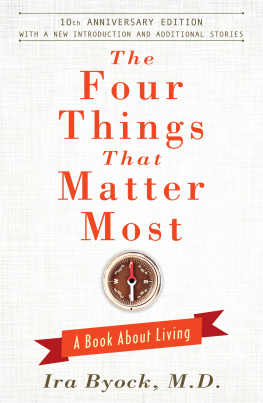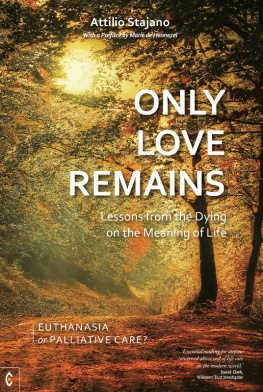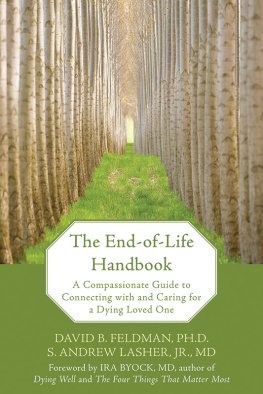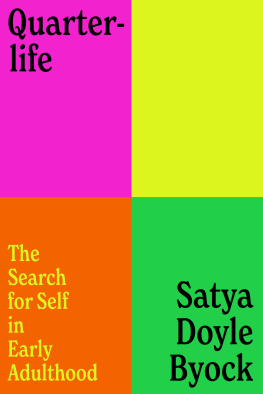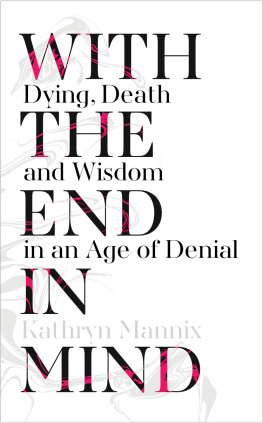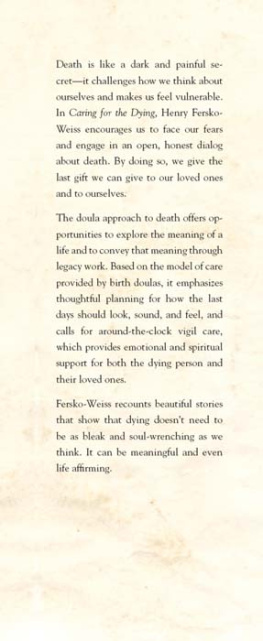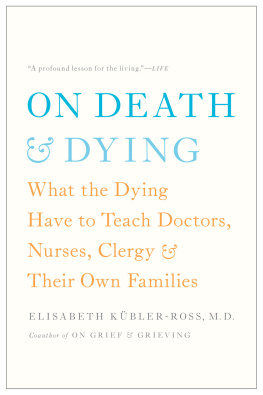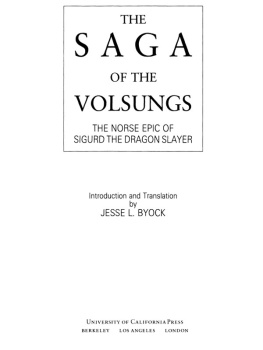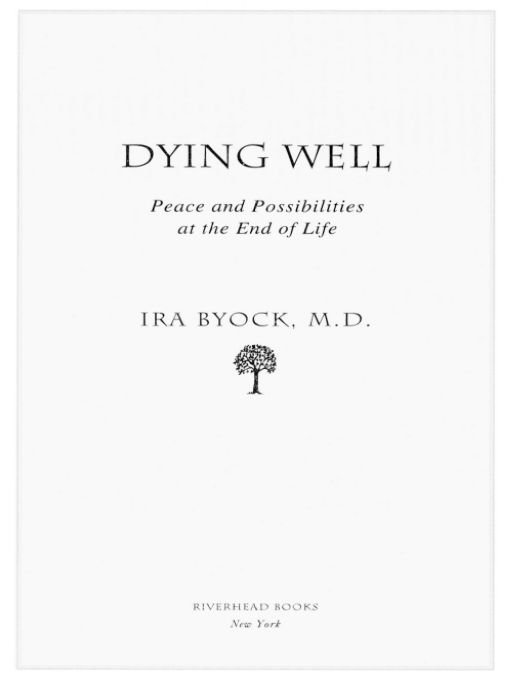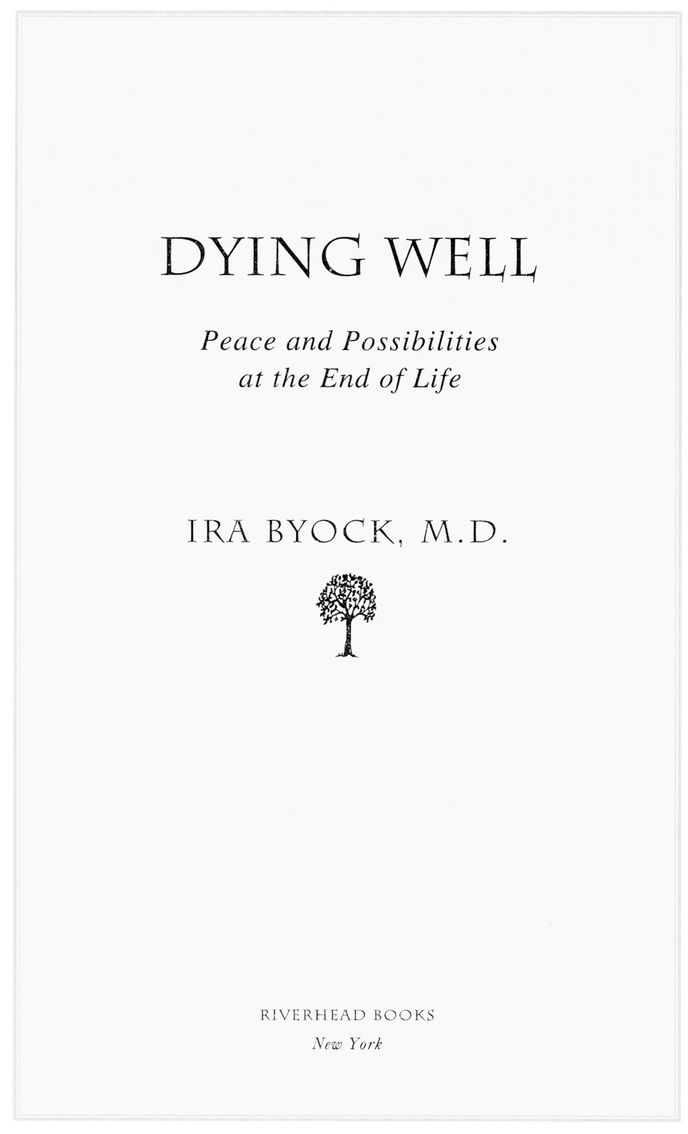Table of Contents
Ira Byock sounds both a note of hope and a call to action as he shows us that there is a better way for the medical profession to care for the dying.
Dr. Balfour Mount,
Eric M. Flanders Professor of Palliative Medicine,
McGill University
Learning to die well can be a personal triumph as well as a family legacy. Dying Well is a remarkable gift, practical and loving, and an inspiring guide for all of us.
Bookpage
This study of how to die well displays uncommon vitality.... Not only is this book informative, especially the question-and-answer section at the end, it is also insightful. Readers will sense Byocks personal growth as his understanding of final issues flowers through a twenty-year specialization.
Publishers Weekly
[Byocks] expertise, clearsightedness and empathy are clear.
The Washington Post Book World
If you or anyone in your family fears dying in pain, considers dying only a series of losses, or thinks a dying person is a burden, read this book! Ira Byocks moving stories illustrate instances of personal development and deepened spiritual peace in people who are dying, of increased closeness in families, and of the healing of troubled relationships.
Patricia Kelley, coauthor of Final Gifts and
author of Companion to Grief
Most Riverhead Books are available at special quantity discounts for
bulk purchases for sales promotions, premiums, fund-raising or
educational use. Special books, or book excerpts, can also be
created to fit specific needs.
For details, write: Special Markets, The Berkley Publishing Group,
375 Hudson Street, New York, New York 10014.
To Seymour Byock,
who taught me about living,
and to
Lila and Satya,
that they may know what
I have learned
I had learned that all the greatest and most important problems of life are fundamentally insoluble.... They can never be solved, but only outgrown.
Carl Jung, from the Introduction to The Secret of the Golden Flower
INTRODUCTION
While death may cast a long shadow upon us as we journey through life, Americans typically refuse to notice. We stride ahead, looking toward a bright future, concentrating on health and living fully. We exercise, eat fiber, know exactly how much fat we consume and exactly what type. We check ourselves for lumps. We make jokes about death to diminish its power, using laughter to insulate ourselves from fear. But, then, when death approaches, we are stunned and feel unprepared to deal with the situation we face. We dont know the right thing to do or say, and so we may retreat, turning over to professionals. In reflexively turning away from reminders of death, we have at times inadvertently isolated loved ones who needed our presence, and we have robbed ourselves of precious opportunities. Socially we have paid dearly, and culturally we are poorer for failing to explore the inherently human experience of dying.
But many of us have come to realize that death and dying are no longer mere abstractions. We have already taken care of a grandparent or a parent who was dying. Some of us have helped care for a dying sibling, others of us have lain beside a dying spouse. Some of us have even cradled children as they died. And some will be reading this book while facing, as we all will, death itself.
Through my years as a hospice doctor, I have learned that dying does not have to be agonizing. Physical suffering can always be alleviated. People need not die alone; many times the calm, caring presence of another can soothe a dying persons anguish. I think it is realistic to hope for a future in which nobody has to die alone and nobody has to die with their pain untreated. But comfort and companionship are not all there is. I have learned from my patients and their families a surprising truth about dying: this stage of life holds remarkable possibilities. Despite the arduous nature of the experience, when people are relatively comfortable and know that they are not going to be abandoned, they frequently find ways to strengthen bonds with people they love and to create moments of profound meaning in their final passage.
As a physician, being present as someone is dying tears the boundaries between the personal and professional realms of my being. The experience of a patient dying challenges me to accept a more intimate, and yet more deeply respectful, relationship with that person. I do not know how it could be otherwise. While I may bring clinical skills and years of experience to the task, ultimately I am simply present, offering to help and wanting to learn.
Over the years I have learned that the actual range of human experience of dying is broad. I have seen tremendous suffering, but I have also witnessed people who in their dying experienced a sense of wellness and peace that can only be called blissful. The stories I have chosen to tell in this book represent this wide range of experiences. Stories are the only satisfying way I know of exploring the paradox that people can become stronger and more whole as physical weakness becomes overwhelming and life itself wanes. The stories of patients and their families who appear on these pages show us how we can grow stronger within ourselves and closer to those we love as we confront the challenges of dying with honesty, caring, and commitment.
In each chapter, you will find a specific aspect of human development, or personal growth, associated with this inevitable phase of life. Each exposes another point on the continuum between suffering and grace. Readers should feel free to read chapters in an order and at a pace that seems right. Some stories highlight the interpersonal or internal conflicts that need to be resolved; others deal with the emotional skills or strategies that remain valuable even at the end of life.
The events and circumstances in these stories are real. In all but one chapter, the names of patients and families and key identifying information have been changed to protect the privacy of the families. In chapter nine, actual names are used, both by request of the Merseal family and because Michaels story has previously been part of the HBO film Letting Go: A Hospice Journey. In a few instances, for the sake of simplicity, events from two actual cases have been combined or the chronology has been slightly modified. Care has been taken to preserve the context and meaning of the events.
Dying Well is a book about living. It is a book about realizing the human potential to growas individuals and as members of familiesthrough the process of dying. Being with people who are dying in conscious and caring ways is of value to them and to us. Their reminiscences, our care, and the time we spend together all contribute to a legacy that enriches our lives. Dying Well tells stories about tragedy, but also about love, commitment, and courage; stories of people living in the shadow of death while growing within themselves and becoming closer with the ones they love.
In the ongoing research for this book and discussions with family members during its writing, I discovered that telling the story of a loved ones dyingand receiving the story of anothercan be healing acts. In telling our stories we honor the person who has died, and, in a way, renew that cherished connection. In receiving a story as inherently intimate as the dying of a lover, grandparent, parent, sibling, close friend, or child, new connections are made and each persons community expands just a bit. I offer this book in the hope that it inspires others to tell their storiesand all of us to listen well.


